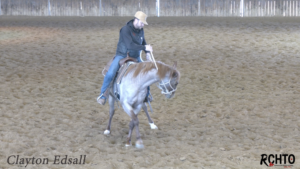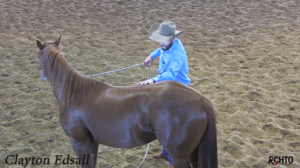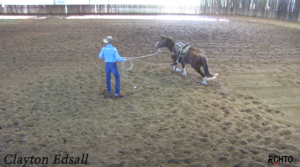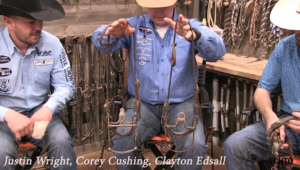Age: 38
From: Oakdale CA
Phone: 406 925 0786
Clayton Edsall
Money Won
$1,747,804Titles/Finals
- Worlds Greatest Horseman 2016
- NRCHA Derby Open Champion 2019
- NRCHA Hackamore World Champion 2018
- NRCHA Stallion Stakes Open Champion 2018
- NSHA Derby Open Champion 2018
- NSHA Open Futurity Intermediate Champion 2016
- NRCHA Open Two Rein Reserve National Champion
Top Three Horses Trained
- Skeets Oak Peppy
- Bet He Sparks
- Metallic Train
Ranching has been a way of life for Clayton Edsall and it is something he infuses into his performance horse program. He grew up in Montana and was interested in starting colts and ranch roping. He was around legendary horsemen like Tom Dorrance, Ray Hunt, Joe Walter, and Brian Neubert. Later, he met Tink Elordi who introduced him to the cow horse maneuvers. Edsall worked on ranches and didn’t start showing until he was about 23 on horses he owned and used on the ranch. Then people slowly started sending him horses.
Based in Oakdale, California, Edsall has won just about everything there is to win in the NRCHA. Some of his titles include the 2016 World’s Greatest Horseman, 2018 NRCHA Derby Open Champion, 2018 NRCHA Hackamore World Champion, 2018 NRCHA Stallion Stakes Open Champion, 2019 NRCHA Derby Open Champion. Now he is looking to clinch the NRCHA Open Snaffle Bit Futurity.
What is your training philosophy?
“I seem to do better when I try to figure out their minds. Not so much of the drills or physical stuff, [though] that’s all part of it… it intrigues me to take a horse and try to get him as comfortable as I can and get him to do as much as he can on his own. That’s probably my background as a kid, starting colts and using them on the ranch. Even right now, if I find myself not getting as much [done] as I like, I try to find a way to use them…try to give them a job they can relate to instead of just maneuvers and drills. I think that sometimes these horses are so smart they don’t see the value in some of that. They seem to find a value in doing a job.”
Most important trait in a horse?
“…If I can develop a horse that wants to try and wants to please me and not in a dominating way but just one that you develop that work ethic in – I think that’s the most important thing. If you have one that tries and has a good work ethic and you start to develop consistency, even if he’s not the best turner or stopper – if you can develop the consistency and keep them trying, you can present them in different areas to try and either make up some ground or not get yourself in a penalty box. That’s what really appeals to me in the cow horse…”
What is your best attribute as a trainer?
“I’ve always been under the impression that horses need to be taken care of to the best of your ability. So much goes into the feeding and taking care of them. The training as well, but I try to take care of them the best I can and keep them as happy as I can. I think that if you can keep that mentality sometimes the horses start to rise to the occasion…”
What have you learned or adjusted in your program in the past year?
“…Every year I try to find a few things and concentrate on trying to get just a little bit better…It’s not about reworking your program, it’s about trying to add to it a little bit. I see a lot of people, especially young trainers, they try something completely different…”
What advice would you give to an up and coming trainer?
“I really think that if you are going to break out, especially in the show horse world, that you have to be incredibly good because the competition is so stiff…For a young guy, taking care of those horses is paramount….So do your job, they are paying you to do your job even if it’s not a favorable horse, do your job and take care of your customers. Pretty soon, word is going to get around…
“I’ve had guys work for me and I try to explain to them [that] I don’t need help riding the best ones or the older ones. You go find the one in the barn that’s not doing the best and you spend twice as much time on that one. You have to elevate the bottom to even out a program.”
How do you define feel?
“When you pick up on a horse whether it’s your reins or halter rope. It doesn’t matter if you’re on the ground or if you’re picking a horse’s foot up…to me a person that is trying to develop feel in themselves and their horses – when they reach for the horse you should start to know how that horse is going to act before you take ahold of his mouth or put your legs on him…
“…[Often] I see people go to pick up on the horse whether they are going to pull him like a reining stop or on a cow and their horse has told them ahead of time how he’s going to react to that pull or that cow or cue and then they’ve missed it and then everything gets lost. So if you can start to develop that feel in the horse and you reach for him… and he says no I need more help, you’re able to fill in and provide that help whether it’s completing that stop or helping him read that cow.”
Best Tip?
“One thing I go back to from the first Tom Dorrance clinic I went to…If the horse reaches equal in front and behind, he will be round. If I can walk and trot perfect circles meaning the stride in front of the horse and the stride behind the horse is the exact same that horse has to be round in his back. And if he’s round in his back he can’t be elevated in the neck and he can’t be stiff anywhere. One thing I do before I go to train, show or warmup is trot perfect circles. I trot a lot of serpentines and figure eights. I pick a spot in the arena where I know is the exact center of my circle and I trot circles. They can be bigger circles or little circles however it fits…”
Videos by Clayton Edsall

How To Soften A Stiff Horse With Clayton Edsall.
...
Great Exercise To Help A Horse Step Forward Into The Rein Work Turn Around With Clayton Edsall.
...
Is Your Horse Hiding His Stiffness In The Loins Not The Face, With Clayton Edsall
...
How To Balance A Young Horse From The Ground And Saddle With Clayton Edsall
...
